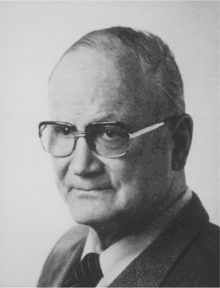Friedrich Wegener
Friedrich Wegener (7 April 1907, Varel – 9 July 1990, Lübeck, [veːɡɐnəɐ̯]) was a German pathologist who is notable for his description of a rare disease originally referred to Wegener disease and now referred to as granulomatosis with polyangiitis. Although this disease was known before Wegener's description, from the 1950s onwards it was generally referred to as Wegener's granulomatosis.[1]

Biography
Early life
Friedrich Wegener was born on 7 April 1907 in Varel, Oldenburg, Germany. His father was a doctor and his mother a Swedish gymnastic director.[2]
World War II Era
More detail about aspects of Wegener's biography during the Nazi regime first became available in 2006.[3] Wegener joined the Nazi Party in 1932.[1] Specifically, he was a member of the Sturmabteilung, a paramilitary branch of the Nazi party that participated in violent conflicts.[4] As a relatively high-ranking military physician, he spent some of World War II in a medical office three blocks from the Łódź Ghetto, a Jewish ghetto in Łódź, Poland.[1] He conducted autopsies on Jewish concentration camp inmates and the facility he worked in performed experiments on prisoners.[1][4] There is no direct evidence of active participation of Wegener in these human experiments, but it is likely he was aware of them.[5][6] The United Nations War Crimes Commission had a legal mandate against Friedrich Wegener and the Polish Institute for the Prosecution of German War Crimes confirmed that he had appeared on the central list of war criminal and security suspects.[5] Wegener was released without a trial as no charges were brought against him.[7] In an editorial in 2006 the evidence was regarded as “thin but tangible."[8]
Medical contributions
In 1936, Friedrich Wegener described the disease that once bore his name, Wegener disease, as systemic disorder characterized by aseptic vasculitis granulomatous inflammation and vasculitis which affects the upper and lower respiratory tracts and the kidneys. Granulomatosis with Polyangiitis is a relatively rare disorder, occurring in 1/25,000 persons.[9] After revelations about his Nazi Party past became common knowledge, the disease has been referred to as Granulomatosis with Polyangiitis (GPA).
The American College of Chest Physicians (ACCP) awarded Wegener a “master clinician” prize in 1989.[1] After his Nazi past was discovered in 2000, the ACCP rescinded the prize and campaigned to rename Wegener's granulomatosis to ANCA-associated granulomatous vasculitis.[1] More recently, several professional societies, including the American College of Rheumatology, the European League Against Rheumatism, and the American Society of Nephrology, proposed the name 'granulomatosis with polyangiitis' in a 2011 editorial.[5][10] The new name for the condition is now widely adopted in the scientific literature and by institutions and charities.[11]
References
- Feder, Barnaby J. (22 January 2008). "A Nazi Past Casts a Pall on Name of a Disease". The New York Times.
- Transactions of the Medical Society of London, Volumes 109-111. Harrison and Sons. 1994
- Woywodt, A; Haubitz, M; Haller, H; Matteson, E. "Wegener's granulomatosis". Lancet. 22, 367(9519): 1362–1366.
- Lubitz, MG (February 2018). "Granulomatosis With Polyangiitis-A Moral Impetus for Change". JAMA Otolaryngology–Head & Neck Surgery. 144 (2): 101. doi:10.1001/jamaoto.2017.2140. PMID 29121164.
- Bachmeyer, C; Halioua, B (May 2013). ""Granulomatosis with polyangiitis (Wegener's)" for "Wegener granulomatosis": dermatology journals should also adopt the alternative name". JAMA Dermatology. 149 (5): 526–7. doi:10.1001/jamadermatol.2013.2060. PMID 23677076.
- Lefrak, SS; Matteson, EL (December 2007). "Freidrich Wegener: the past and present". Chest. 132 (6): 2065. doi:10.1378/chest.07-2353. PMID 18079256.
- Rosen, MJ (September 2007). "Dr. Friedrich Wegener, the ACCP, and History". Chest. 132 (3): 739–41. doi:10.1378/chest.07-0769. PMID 17873183.
- Jeffcoate, William. "Should eponyms be actively detached from diseases?". Lancet. 22, 367(9519): 1296–1297.
- Non-neoplastic Disorders of the Lower Respiratory Tract. by William D Travis. Publisher: Washington, DC American Registry of Pathology 2002
- Falk RJ, Gross WL, Guillevin L, Hoffman GS, Jayne DR, Jennette JC, Kallenberg CG, Luqmani R, Mahr AD, Matteson EL, Merkel PA, Specks U, Watts RA (2011). "Granulomatosis with polyangiitis (Wegener's): an alternative name for Wegener's granulomatosis". Arthritis Rheum. 63 (4): 863–4. doi:10.1002/art.30286. PMID 21374588.
- "Videos: Granulomatosis with Polyangiitis". Vasculitis Foundation.
Further reading
- Woywodt A, Haubitz M, Haller H, Matteson EL (2006). "Wegener's granulomatosis". Lancet. 367 (9519): 1362–6. doi:10.1016/S0140-6736(06)68583-8. PMID 16631915. S2CID 888374.
- Woywodt A, Matteson EL (2006). "Wegener's granulomatosis--probing the untold past of the man behind the eponym". Rheumatology (Oxford). 45 (10): 1303–6. doi:10.1093/rheumatology/kel258. PMID 16887845.
- Grzybowski A, Rohrbach JM (2011)Should we abandon the eponym 'Wegener's granulomatosis'? A historical excursion (Letter to the editor). Retina 31, 1439-1442